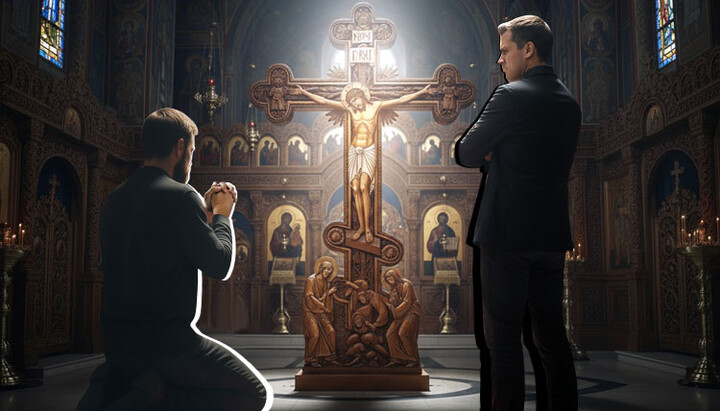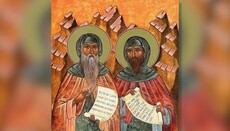Christ's Sacrifice: Why is salvation not only a gift but also a choice?

On September 9, many countries around the world celebrate Forgiveness Day or Reconciliation Day. Let's talk about God's mercy and the paradoxical problems with understanding this grace.
The fact is that almost every religion speaks of responsibility and punishment for sin. Each one teaches that “everyone will have to answer for their actions”. There is a concept of a universal human religious experience, which—though expressed differently and through various images—ultimately conveys the same message. Its essence is simple: within every person exists an inner law that clearly distinguishes between good and evil, falsehood and truth, mercy and cruelty, and so on.
Every person must live without violating the moral requirements of this law. After transitioning from earthly life to some other world, a person faces judgment and retribution for everything that happened in this life.What awaits a person after death has various interpretations, but the essence of all religions is the same – one must live heeding the voice of conscience and the religious commandments that align with that conscience.
The uniqueness of the Christian doctrine of salvation
Christianity differs from other world and most national religions. It states that no human virtue can save a person from destruction. We do not possess such moral strength that would allow a person to ascend to heaven.
The central doctrine of Christianity is the belief that Jesus Christ, the Son of God, offered Himself as a redemptive Sacrifice for the sins of all humanity.
His death on the Cross is viewed as a ransom that freed humanity from the power of sin and death, opening the way to eternal life. This sacrifice is considered the only and sufficient atonement for all people. We have been redeemed from the power of sin and decay at the price paid by God Himself.
However, in the Orthodox tradition, we are often immersed in a certain darkness of hopeless sorrow, which is difficult to call repentance. This sorrow has rooted in us so deeply that we consider it our tradition, our correct worldview, calling it «repentance» and cherishing it like the apple of our eye, fearing to let even a ray of joy into our soul. However, we do allow a ray, but no more than for one Paschal week. Only seven days a year do we have for the submarine of our soul to rise to the Light and the Sun of Truth, and then we plunge again into the dark depths of the night, calling it «repentance».
Trials: Does Tradition contradict Scripture?
And for this, the Orthodox have good reasons. On the one hand, the Word of God speaks of Christ's Sacrifice as a guarantee of our salvation. «Everyone who calls on the name of the Lord will be saved» (Rom. 10:13). «I am the resurrection and the life; whoever believes in Me, though he die, yet shall he live. And everyone who lives and believes in Me shall never die» (John 11:25-26), and so on.
But, on the other hand, we see that in His parables, Christ emphasizes the same principle of human responsibility for life as other religions do. This is the image of a king who came to demand from his subjects, the image of an employer requiring an account from his workers, the image of a judge examining our actions and deeds. We must multiply talents, bring forth fruits, and so on. The only exception is the parable of the prodigal son, but even here the son needs to take certain actions to be able to return to the Father's house and not remain «in a far country» forever.
If Christ says that the believer in Him does not come to judgment but passes from death to life, Tradition contradicts this revelation with the teaching of the toll houses.
It teaches the opposite: the soul does indeed go to judgment. One might approach the descriptions of the toll houses, as presented in the life of Basil the New, with skepticism—if it weren’t for the fact that such saints as John Chrysostom, Macarius the Great, Cyril of Alexandria, and others also wrote about post-mortem trials of the soul, even though they did not use the term “toll houses”, Their works speak of the soul, after separation from the body, passing through certain «airborne principalities» or «airborne forces of evil» that try to stop it and drag it down into hell.
Thus, we again return to the scheme of universal religious experience, which speaks of spiritual labor and retribution.
Buddhism teaches the necessity of changing consciousness, Islam – the necessity of following the law. Christian morality – about living according to Christ's commandments.
And yes, «if the righteous is scarcely saved, what will become of the ungodly and the sinner?» (1 Pet. 4:18).
How to embrace Christ's Sacrifice?
But still, what about Christ's Sacrifice? God Himself became man to save us. And if God wants something, and He clearly said: «I have no pleasure in the death of the wicked, but that the wicked turn from his way and live» (Ezek. 33:11), then who can stand in His way? Did the deal not take place? Is the Blood of the Son of God not enough to wash away all our sins?
If we turn to the scribes, who think they know the answers to all questions, we will hear the following:
Christ's Sacrifice was all-encompassing and more than sufficient for the redemption of all humanity. But it cannot be embraced automatically, without the consent and will of the person themselves.
Therefore, the response to Christ's Sacrifice is our virtuous life according to His commandments. This life itself is not salvific for us, no matter how holy we may be. We are saved solely by Christ's Sacrifice, but piety is the practical embodiment of our faith and love for God.
In other words, personal righteousness is a necessary condition that makes the Sacrifice of Christ not only valid but also effective for each individual soul that has accepted Christ as their Personal Savior.
That’s all clear. But what should our measure be? After all, every person has different potential and capabilities. God’s commandments are the same for everyone, but people are different. As classic examples, we have the lives of the saints, reading which most of us are bound to fall into despair, realizing that this standard feels unattainable for us.
If we take the lives of martyrs, venerable saints, and great righteous ones as the only norm, reaching which guarantees salvation, then it’s hard to call Christ a Savior. Because out of millions who consider themselves believers and try to live by the commandments to the best of their strength and abilities, only a handful might be saved.
God – Father, not Judge
I do not urge to imitate Protestants, who with their self-confidence in already secured salvation, radiate a happy optimism. There’s something artificial and insincere about that. But the depressive Orthodox “whining” about “the end is near, and you will be troubled” doesn’t give us much hope either.
So where can we find that right balance that prevents the soul from falling into the abyss of dark despair over its inability to live as it wishes on one hand, and from self-deception about having a guaranteed place in the Kingdom of God on the other?
There is no unequivocal answer to this question. Spiritual life is an art where one cannot afford to relax and fall into negligence about one's salvation, but also cannot despair that everything in spiritual life is not going as we would like.
Ultimately, the meaning of all our efforts lies in this: by recognizing our weakness, we do not fall into pride and a high opinion of ourselves, but rather come to saving humility and the understanding that “without God, we can do nothing”.
We must try to see in God first of all a loving Father, and not only a Judge and Rewarder;
The Father who loves His children with unconditional love, who is pleased when we strive with our pious life to show Him our love, and saddened when we live as egoists, thinking only of our benefit. Yes, of course, there’s a hint of anthropomorphism here but didn’t Christ Himself use such images to help us better understand the nature of God?
Did He not put the word «Father» as the first word in addressing God? Did the Savior not say: «I am going to My Father and your Father...»? If so, can a loving Father be reduced only to the image of a judge and prosecutor? Wouldn't this be a profound distortion of the Image that Christ reveals to us?
I think it would not be a sin to sometimes look at the world through God's eyes, to look as a loving Father would look at His children.
Perhaps then it will become clearer to us how we should live and what we should strive for. After all, for the Father, the main thing is not the result, but the striving; what matters to Him is not the final outcome of human efforts, but the very diligence we apply in pursuing salvation. The ultimate result depends not on us but on Him; from us, only the desire and labor combined with humility and repentance. Then we won’t need to worry that we are so unlike the top achievers who seemed to succeed much more.
Let us hope that we are no less loved by God simply because, despite everything, we have not despaired, have not succumbed to despondency, and have remained faithful to Him. And this will be the best remedy against both negligence and despair. The question of salvation is not about reaching a certain standard, but about continually moving in the right direction. This, in turn, will be the answer to many of our questions about personal salvation.











